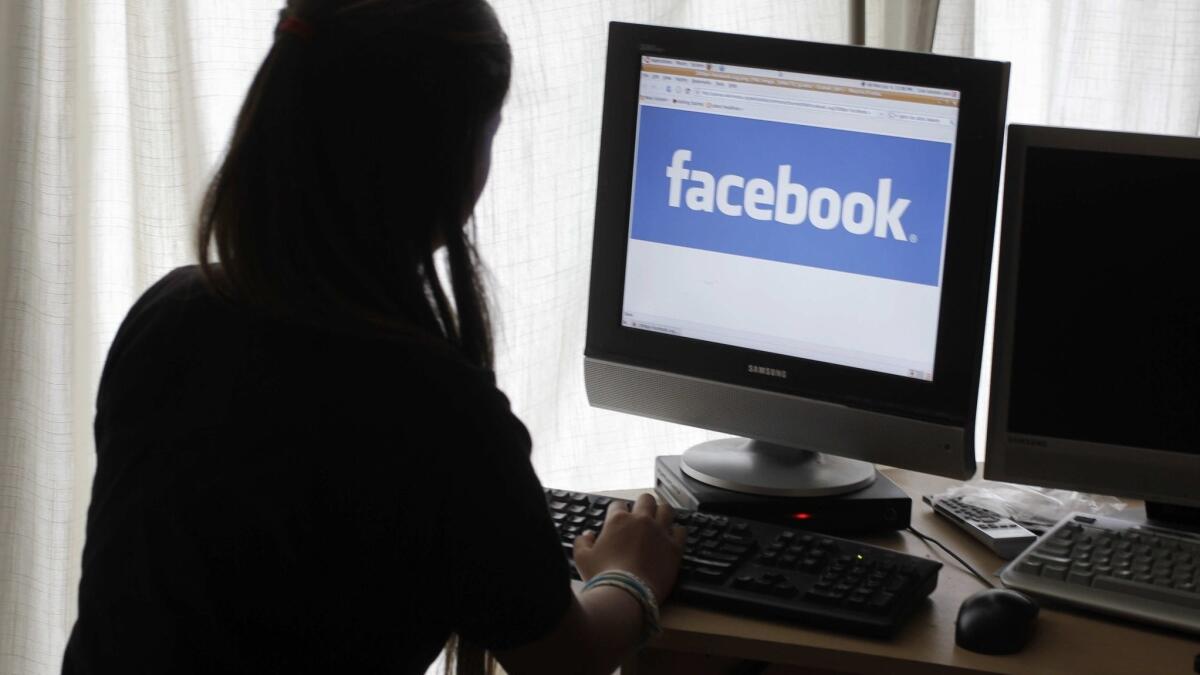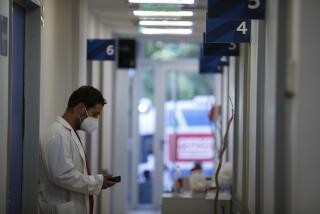Paging Dr. Facebook: How the social network could help doctors screen patients for depression

- Share via
More than half of Americans who suffer from depression never get any treatment, and in many cases that’s because their symptoms are never diagnosed. The U.S. Preventive Services Task Force advises primary care physicians to screen all of their patients for depression and make sure proper care gets to those who need it, but this is a big job and doctors could use some help.
Paging Dr. Facebook, stat!
A new study argues that doctors could gain valuable insight into their patients’ mental health by monitoring the statements they post on Facebook. In tests, researchers found certain patterns in Facebook posts that preceded a clinical diagnosis of depression.
“One day, the analysis of social media language could serve as a scalable front-line tool for the identification of depressed individuals,” the study authors wrote Monday in the Proceedings of the National Academy of Sciences.
If that prospect seems unsettling, consider what may come next: algorithms that interpret the facial expressions in Facebook users’ photos and videos, or software that tracks the physical location of a patient’s phone and how often it is used.
The idea is not to turn doctors into full-time snoops, but to make it easier to flag patients who may be at risk so that they can get the help they need.
“Detection and treatment of mental illness may soon meet individuals in the digital spaces they already inhabit,” wrote the team led by Johannes Eichstaedt, a computational social scientist in psychology at the University of Pennsylvania.
Eichstaedt and his colleagues invited patients seeking treatment in the emergency room of a large, urban hospital to participate in the study. Over 26 months, 1,175 patients gave the researchers access to their Facebook accounts and their electronic medical records.
Among this group, 176 patients had been diagnosed with major depression or another type of depressive disorder, and 114 of them had posted at least 500 words in their Facebook status updates before their diagnosis was made. The majority of these patients were African American (74%) and women (87%), with an average age of 31.
For each of these 114 patients, the researchers randomly selected five other patients who had not been diagnosed with depression to serve as controls. That way, the prevalence of diagnosed depression in the study would mirror that in the real world, the study authors wrote. Most of the patients in the control group were also African American (69%) and women (75%), with an average age of 30.
The most notable difference between the two groups was the number of words they had posted on Facebook. The average word count for patients who were depressed was 19,784, and the median word count (the number at which half of patients wrote more and half wrote less) was 10,655. In the other group, the average word count was 14,802 and the median word count was 6,861.
Altogether, the 684 patients posted 524,292 Facebook status updates that were used in the analysis. The researchers used a software program to identify 200 topics discussed by each patient, which served as a marker for their overall language use. They also determined that the patients’ posts contained 5,381 words or short phrases that were used by at least 20% of these study participants.
The researchers’ goal was to create a mathematical model that could predict which patients would go on to be diagnosed with depression and which ones would not. The statistical method they used would consider their model a success if it achieved at least a 0.70 on a metric called the “area under the curve,” or AUC. Theirs fell just short, at 0.69.
The team tried to improve the AUC by including factors such as the length, frequency and timing of patients’ Facebook posts, as well as basic demographic information. None of this information improved the predictive power of their model.
Next, the researchers wondered how far in advance a patient’s Facebook activity could predict a depression diagnosis. The answer: The closer in time, the better. When they limited their analysis to status updates posted in the six months before diagnosis, the AUC rose to 0.72. When they pushed the window back and considered status updates made three to nine months before the diagnosis, the AUC dropped to 0.62.
Eichstaedt and his colleagues identified 10 topics that were most likely to be linked with a depression diagnosis.
Four of these topics conveyed “depressed mood and feeling,” the researchers wrote. They were characterized by words like “better” and “feel”; “tears,” “cry” and “pain”; “ugh,” “sick” and “hate”; and “feel,” “how” and “hurt.”
Two more topics expressed hostility. One topic was marked by words like “hate” and “f***in” and the other by words like “now” and “right.”
Another two topics expressed physical discomfort. One was clustered around the words “sick,” “feel” and “ugh,” and the other included “hurt” and “head.”
One of the remaining topics involved references that were overtly medical, with words like “hospital,” “pain” and “surgery.”
The last one centered on loneliness, including words like “miss” and “much.”
The researchers said the predictive power of their model is comparable to that of screening surveys, even though it requires less effort for both patients and their doctors.
“Although this prediction accuracy is relatively modest, it suggests that, perhaps in conjunction with other forms of unobtrusive digital screening, the potential exists to develop burdenless indicators of mental illness,” they wrote.
But before physicians start tapping into Facebook accounts, they should give careful thought to protecting their patients’ privacy, and the privacy of their data, the researchers warned. Doctors should also keep in mind that patients may learn to adjust the way they express themselves online to avoid being flagged by depression-screening algorithms.
Still, the need for better screening tools is clear, and this could be one of them, Eichstaedt and his colleagues wrote.
If so, it could do more than improve mental health, since people with depression experience worse health overall.
“Identifying patients at an earlier stage in their mental illness through novel means of detection creates opportunities for patients to be connected more readily with appropriate care,” the researchers concluded.
Follow me on Twitter @LATkarenkaplan and “like” Los Angeles Times Science & Health on Facebook.
MORE IN SCIENCE







